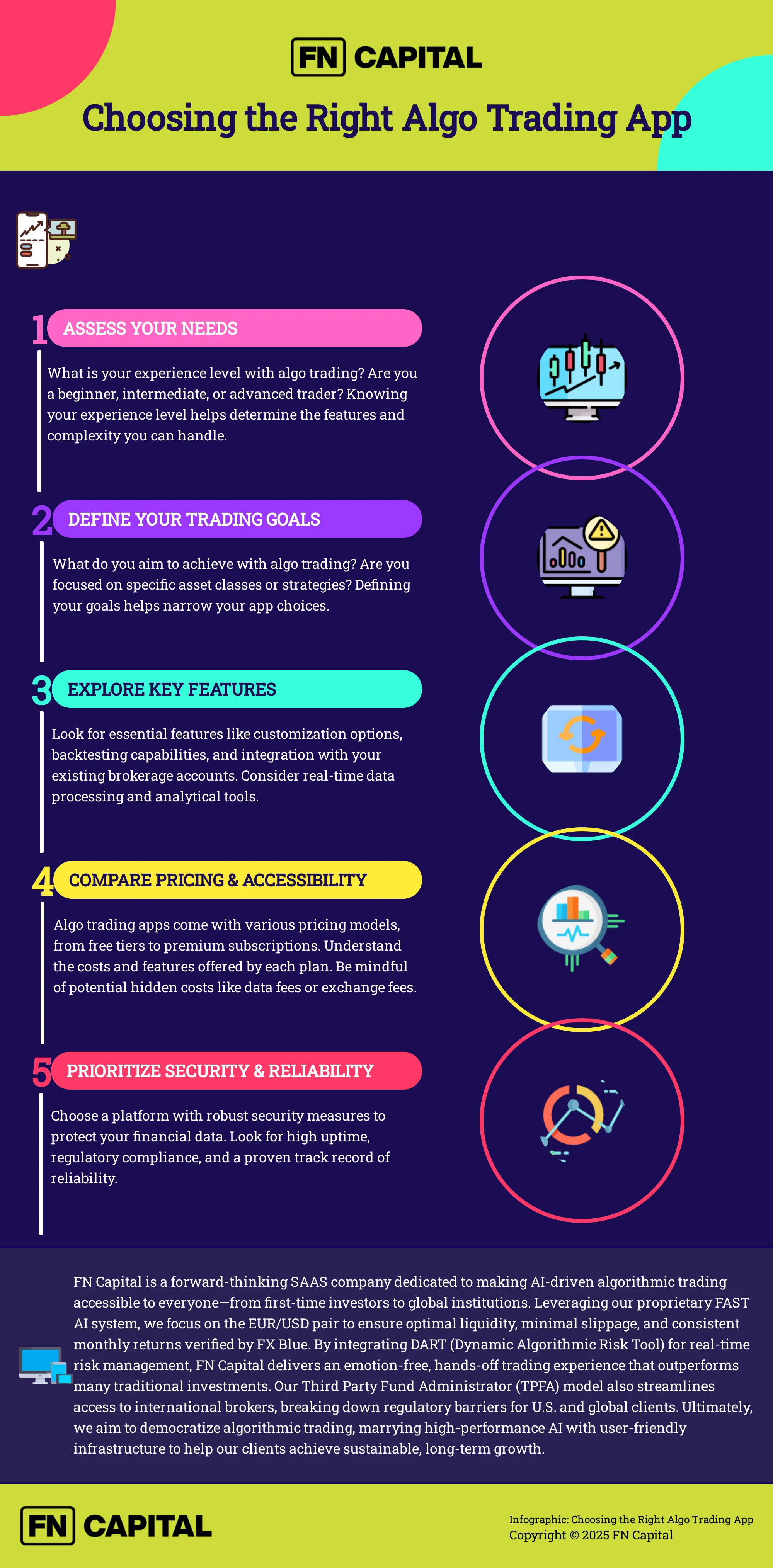Looking to harness the power of AI and automation in your trading journey? The best algo trading apps 2025 offer a unique opportunity to streamline your strategies, minimize emotional biases, and potentially maximize your returns. This guide will walk you through the essential features to consider when choosing an algo trading app, from user interface and customization options to backtesting capabilities and real-time data processing. We’ll also delve into the importance of security, reliability, and regulatory compliance, providing you with a comprehensive framework for making informed decisions. Whether you’re a beginner taking your first steps into automated trading or an experienced trader seeking advanced tools, this guide is your essential companion.
Key Takeaways
- Algo trading apps automate your trades, but tech failures and bad data can hurt. Pick a platform that matches your skills and offers strong risk management.
- A good algo trading app needs a friendly interface, customization, backtesting, and secure APIs. Think about price, user reviews, and how well it handles real-time data.
- AI, blockchain, and better design are changing algo trading. Find platforms using these technologies to improve your trading and stay ahead.
What Are Algo Trading Apps?
Algo trading apps let you automate the trading process using algorithms, allowing for efficient execution of large trade volumes. This approach, popular with both institutional and retail traders, analyzes vast amounts of real-time market data, helping you capitalize on market opportunities faster than manual trading allows. Essentially, these apps use computer programs to automatically execute trades based on predefined rules and mathematical models. This removes human emotion from trading decisions.
It’s worth noting that these apps rely heavily on technology. Technical failures can disrupt algorithms and lead to unexpected losses. Similarly, these apps need accurate real-time and historical market data. Any latency during the algorithmic trading process could mean missed opportunities.
Top Algo Trading Apps
Finding the right algo trading app can feel overwhelming. There are countless options, each with its own strengths and weaknesses. To simplify your search, we’ve compiled a list of top contenders, including our own offering at FN Capital.
FN Capital’s FAST AI
FN Capital’s FAST AI caters to both individual and institutional investors. Our system focuses on the EUR/USD pair, leveraging its high liquidity for efficient execution. We combine a proprietary high-frequency trading algorithm with a dynamic risk management tool (DART) to pinpoint and capitalize on low-risk, high-probability opportunities. For a hands-off, AI-driven approach to forex trading, FN Capital offers a 100-day money-back guarantee, allowing you to explore the platform risk-free. Learn more and register for an account on our website.
Tradetron
Tradetron is a versatile platform supporting multiple asset classes. Its user-friendly design makes it a solid option for beginners, while its robust features also cater to experienced traders. If automating your trading strategies is a priority, Tradetron is worth exploring. Find more details about Tradetron’s features and pricing on their website.
AlgoBulls
AlgoBulls distinguishes itself with its visual strategy builder and community features. These tools empower users to create and share trading strategies, fostering a collaborative learning environment. This platform is particularly helpful for those new to algorithmic trading. See how AlgoBulls can help you get started on their website.
Quantman
Known for its intuitive interface and backtesting capabilities, Quantman allows traders to refine their strategies before risking real capital. This feature is crucial for optimizing algorithms and minimizing potential losses. Visit Quantman’s website for more information.
Bigul API
For developers and traders comfortable with coding, the Bigul API offers seamless, free integration with Python. This allows for maximum customization and control over your trading algorithms. Learn more about integrating the Bigul API on their blog.
Robo Trader
Robo Trader simplifies strategy creation and execution with its visual builder and expert signals. This makes it accessible to traders who prefer a visual approach and don’t want to deal with complex coding. Explore Robo Trader’s features and pricing on their website.
MetaTrader 5
MetaTrader 5 is a widely used platform known for its comprehensive features and support for algorithmic trading. It’s a popular choice among traders for its versatility and robust functionality. You can find more information about MetaTrader 5 on the MetaQuotes website.
TradingView
TradingView is a favorite among traders who value community insights and powerful charting tools. Its social trading features allow users to share ideas and learn from each other. Explore TradingView’s platform and community on their website.
Quantconnect
Quantconnect offers a cloud-based platform supporting multiple asset classes and extensive backtesting capabilities. This makes it a suitable option for serious algorithmic traders seeking a scalable and robust solution. Learn more about Quantconnect’s platform on their website.
Key Features in Algo Trading Apps
Looking for the right algo trading app? Here’s a breakdown of essential features:
Advanced AI and Machine Learning Integration
AI and machine learning are transforming how we interact with technology. Leading algo trading apps leverage these advancements to analyze massive datasets, identify complex patterns, and predict market movements with increasing accuracy. This goes beyond basic automation, offering predictive interfaces and personalized insights for a more adaptive and user-centric trading experience. Look for apps that offer AI-driven predictive analytics and continuously learn and adapt to changing market conditions.
User-Friendly Interface
A cluttered or complicated interface can hinder even the most sophisticated trading strategies. Intuitive design is key. The best algo trading apps prioritize user experience with clean dashboards, easy-to-use menus, and clear visualizations of your trading activity. UI/UX design is critical for a smooth, efficient trading process, so prioritize platforms that are both visually appealing and easy to use. Check out FN Capital for an example of a user-friendly interface.
Algorithm Customization Options
Flexibility is paramount in algo trading. Customizable algorithms let you tailor strategies to specific market conditions and risk tolerances. A good algo trading app should offer a range of customization options, allowing you to adjust parameters, define entry and exit rules, and backtest your strategies before deploying them live. Microservices architecture is becoming increasingly popular, enabling platforms to handle large datasets and manage multiple personalized portfolios efficiently. Find an app that offers the algorithm customization you need to refine your approach.
Backtesting Capabilities
Before risking real capital, test your strategies using historical data. Robust backtesting capabilities allow you to simulate trades and evaluate the potential performance of your algorithms under various market scenarios. This helps you identify weaknesses, refine your approach, and gain confidence in your strategies before going live. Look for platforms that offer comprehensive backtesting tools and historical data access.
Real-Time Data Processing and Analytics
In the fast-paced world of algorithmic trading, real-time data is essential. Your app needs to process and analyze market data instantaneously to identify opportunities and execute trades efficiently. Look for platforms with low-latency data feeds, real-time charting, and advanced analytical tools to help you make informed decisions in the moment. Real-time data processing is the backbone of any successful algorithmic trading platform.
API Performance and Security
Secure and reliable APIs are critical for integrating your algo trading app with other platforms and data sources. A well-designed API allows for seamless data exchange and automated trading execution. Prioritize apps with robust API documentation, strong security measures, and reliable performance to ensure smooth integration and protect your trading data. Consider factors like API access, data frequency, and security protocols when evaluating different options.
Enhanced Execution Strategies
Control over your execution strategies is crucial for maximizing profitability. Look for algo trading apps that offer advanced order types, such as limit orders, stop-loss orders, and trailing stops, to manage risk and optimize your entries and exits. The ability to adjust your execution strategies based on real-time market conditions is a key feature of sophisticated trading platforms. A lack of execution strategy control can significantly impact your results, so choose a platform that provides the flexibility and control you need. FN Capital offers insights into dynamic risk controls and volatility management.
Compare Features of Leading Algo Trading Apps
Not all algo trading apps are created equal. When choosing a platform, consider these key features to find the best fit for your trading style and experience level.
User Interface and Ease of Use
A clean, intuitive interface is crucial, especially for beginners. Look for apps with straightforward navigation, clear charts, and easy-to-understand order management tools. TradingView, for example, is known for its user-friendly charting tools and customizable dashboards. The future of app design is moving towards more personalized and adaptable user experiences, so consider platforms that prioritize a seamless and intuitive user journey.
Customization Capabilities
The ability to customize your algorithms is essential for tailoring your trading strategies. Platforms like Tradetron and Quantconnect offer extensive customization options, allowing you to build algorithms using various technical indicators and strategies. You can even code your own custom logic. A modular, microservices-based architecture can offer greater flexibility and scalability for complex trading strategies.
Backtesting and Simulation Tools
Before deploying your algorithms in live markets, robust backtesting tools are essential. These tools allow you to test your strategies against historical data and identify potential weaknesses. You can then optimize your algorithms for better performance. Many platforms, including AlgoBulls and MetaTrader 5, provide backtesting capabilities to help you refine your strategies before risking real capital.
Integration with Trading Platforms
Seamless integration with your preferred brokerage platform is key for efficient order execution. Look for apps that offer direct integration with popular brokers or support API connections for automated trading. Bigul API, for instance, is designed specifically for API integration, enabling you to connect your algorithms directly to your brokerage account. A microservices approach can also improve the efficiency and scalability of platform integrations.
Data Analysis and Reporting Features
Comprehensive data analysis and reporting tools are vital for monitoring performance and making informed trading decisions. Look for apps that provide real-time market data, detailed trade history, and customizable reports. Real-time data processing is crucial for effective algorithmic trading. This allows you to react quickly to market changes and optimize your strategies. FN Capital’s FAST AI, for example, offers transparent performance tracking and reporting through FX Blue.
Pricing and Accessibility
When choosing an algo trading app, pricing and accessibility are key factors. Costs can vary significantly, from free basic plans to premium subscriptions with hefty price tags. Understanding the different pricing models and what they offer will help you find an app that fits your budget and trading goals.
Freemium Options
Some algo trading apps offer freemium models, providing a taste of their features at no cost. These free tiers often include access to basic market data, such as real-time and historical prices, and fundamental financial data. For example, Financial Modeling Prep (FMP) offers a free tier with access to basic stock data. While freemium options are great for beginners or those wanting to explore algo trading without a financial commitment, they typically come with limitations, such as restrictions on the number of algorithms you can run, limited backtesting, or slower execution speeds.
Tiered Subscription Plans
Many algo trading apps offer tiered subscription plans, providing different levels of access and features at increasing price points. These tiers often cater to different levels of trading experience and frequency. A basic plan might suit a casual trader, while a professional trader might need a premium plan with advanced features and higher API request limits. IC Markets, a popular forex and CFD broker, offers various platforms that support automated trading, coupled with tiered commissions and spreads. Carefully consider the features offered at each tier and choose the one that aligns with your needs and budget. Look for transparent pricing structures that clearly outline the costs associated with each tier.
Performance-Based Fees
Some algo trading platforms, particularly those for professional or institutional investors, may charge performance-based fees. This means that in addition to a subscription fee, they take a percentage of your profits. While this can incentivize the platform to maximize your returns, it also means you’ll pay more when you’re successful. Be sure to understand the fee structure and how it impacts your overall profitability. Consider whether a performance-based fee aligns with your risk tolerance and investment strategy.
Hidden Costs
Beyond the upfront costs of subscriptions or performance fees, be aware of potential hidden costs. These can include data fees for real-time market data feeds, exchange fees for executing trades, and even commissions charged by your broker. Latency can also be a hidden cost, as delays in data or execution can lead to missed opportunities or unfavorable prices. Before committing to an algo trading app, thoroughly research all potential costs to avoid surprises. Also, consider the potential impact of technical failures, which can disrupt trading and potentially lead to losses. Factor these potential costs into your budget and risk assessment.
User Reviews and Experiences
Understanding user experiences is crucial when choosing an algo trading app. While each platform boasts unique features, real-world feedback offers valuable insights into their strengths and weaknesses.
Reported Strengths
Users consistently praise the efficiency of algo trading, highlighting its ability to execute large trade volumes. Automated trading, powered by algorithms, analyzes extensive market data in real-time, allowing traders to capitalize on fleeting opportunities, a key advantage noted by Finance World. This speed and efficiency is particularly appealing to both institutional investors and retail traders. Access to numerous platforms that support automated trading, combined with competitive commissions and spreads, contributes to positive user experiences, as highlighted in reviews of platforms like IC Markets.
Common Weaknesses and Limitations
Despite the advantages, users also point out potential downsides. Technical glitches, including software bugs, server downtime, and connectivity problems, can disrupt algorithms and lead to unforeseen losses, as detailed on Investing Robots. Another significant concern is limited control over execution strategies. FX Algo News reports that over half of market leaders want more flexible and adaptable trading solutions. This highlights the importance of platforms that allow users to fine-tune their strategies and respond to changing market conditions.
Overall User Satisfaction
User satisfaction hinges on several factors. Reliable access to accurate real-time and historical market data is paramount. Samco emphasizes that latency issues can lead to missed trading opportunities, impacting overall performance. To address these challenges, many platforms are adopting advanced technologies like microservices architecture. This approach enables platforms to manage massive datasets, process trades rapidly, and support multiple personalized portfolios efficiently, contributing significantly to user satisfaction in the algo trading space.
Choose the Right Algo Trading App for Your Experience
Finding the right algo trading app depends on your experience level. A suitable platform can significantly impact your success, whether you’re a beginner or a seasoned trader. Here’s a breakdown to help you choose:

Best Options for Beginners
For beginners, user-friendliness and educational resources are key. Look for a platform that simplifies complex processes and offers a gentle learning curve. Think drag-and-drop interfaces, pre-built strategies, and paper trading options to practice without risking real capital. Bigul API, with its free access and Python integration, is a great starting point if you have some technical skills. If you prefer a more visual approach, platforms like Quantman, Tradetron, AlgoBulls, or Robo Trader offer intuitive interfaces and backtesting features. Some even have community forums where you can connect with other traders and learn the basics of algo trading.
Intermediate-Level Platforms
As you gain experience, your needs will change. You might want more control over your algorithms, access to advanced order types, and the ability to backtest more complex strategies. Exploring a broader range of platforms becomes beneficial at this stage. Resources like Slashdot’s list of algorithmic trading software can be invaluable. This compilation of 25 platforms offers a good overview of available options, including pricing and user reviews. Consider your coding skills when making your choice. Some platforms cater to non-programmers, while others offer greater flexibility for those comfortable with coding.
Advanced Solutions for Experienced Traders
Experienced traders often require highly customizable platforms with robust APIs, low latency execution, and access to various markets and data feeds. For forex and CFD trading, IC Markets is often cited as a top choice for its support of automated trading. At this level, understanding the technical details of your chosen platform is crucial. Algorithmic trading relies heavily on technology, and any technical failures can have significant financial consequences. InvestingRobots.com offers insights into the potential challenges of algo trading. Remember, due diligence and a deep understanding of your chosen platform are essential for success.
Security and Reliability in Algo Trading Apps
Security and reliability are paramount when choosing an algo trading app. A secure platform protects your financial data and investments, while a reliable platform ensures consistent performance and minimizes disruptions. Let’s explore the key aspects to consider:
Data Protection
Your financial data is sensitive, so robust security measures are essential. Look for platforms that prioritize data encryption and offer cold storage for funds, safeguarding your assets from unauthorized access. Protecting against unauthorized API access is also crucial. Secure API keys and two-factor authentication add extra layers of security, preventing malicious actors from compromising your account. Thorough due diligence on the app provider’s security practices is a must. A platform’s security infrastructure should be a top priority.
Platform Stability and Uptime
Technical failures can disrupt your trading strategies and lead to potential losses. A reliable algo trading app should have a proven track record of stability and high uptime. Consider factors like server infrastructure, redundancy measures, and disaster recovery plans. Inquire about the app’s response to past incidents and their ability to quickly resolve technical issues. Malfunctions due to bugs, server crashes, or connectivity issues can have severe consequences, so choose a platform that minimizes these risks. Aim for a provider with a robust and reliable infrastructure.
Regulatory Compliance
Ensure the algo trading app complies with relevant regulations. This protects you as an investor and fosters trust in the platform. Research the app provider’s licensing and registration status. Verify their adherence to regulatory requirements for data protection, financial reporting, and risk management. For example, some jurisdictions mandate regular audits for algo trading firms, including detailed trade logs and parameter documentation. Understanding these compliance measures helps you make informed decisions and choose a reputable platform. Researching regulatory compliance is a crucial step in selecting a trustworthy algo trading app.
Overcome Common Challenges in Algo Trading
Even with the best algo trading apps, unforeseen challenges can arise. Here’s how to address them proactively:
Manage Technical Failures
Algorithmic trading relies heavily on technology. Bugs, server crashes, or connectivity issues can disrupt algorithms and lead to unexpected losses. Choose a robust platform with built-in redundancy and real-time monitoring. Regularly test and update your algorithms to minimize the risk of malfunctions. A reliable app provider should offer support and troubleshooting assistance to help you quickly resolve any technical problems.
Minimize Latency
Latency—the delay between an order being placed and executed—can make or break your trades. High latency during any part of the process, from receiving market data to executing trades, can mean missed opportunities. Prioritize apps with high-speed data feeds and efficient order routing. Consider co-locating your servers closer to the exchange to reduce physical distance and improve response times.
Ensure Data Quality and Availability
Accurate data is the lifeblood of algorithmic trading. Your algorithms need access to reliable real-time and historical market data to function effectively. Choose a platform that provides high-quality data from reputable sources. Implement data validation checks to identify and correct any inaccuracies. Having a backup data source can also prevent disruptions in case your primary feed experiences issues.
Optimize Execution Strategy Control
Maintaining control over your execution strategies is crucial. A lack of flexibility can hinder your ability to adapt to changing market conditions. Look for adaptable trading solutions that allow you to adjust parameters and refine your approach as needed. Real-time monitoring tools and customizable alerts can help you stay informed and make necessary adjustments on the fly. Backtesting your strategies with historical data can also help you identify potential weaknesses and optimize performance before deploying them in live markets.
The Future of Algo Trading Technology
The world of algo trading is constantly evolving, driven by rapid advancements in technology. Let’s explore some key trends shaping the future of automated trading.
AI-Driven Predictive Analytics
Artificial intelligence is poised to revolutionize how we analyze markets and predict asset price movements. Sophisticated algorithms can identify subtle patterns and correlations in vast datasets, leading to more accurate market predictions and more profitable trading strategies. Imagine AI predicting market shifts with increasing accuracy, allowing your algorithms to adapt and capitalize on emerging opportunities. This predictive power transforms algo trading from reactive to proactive. As AI and machine learning models become more refined, expect even greater precision and efficiency in automated trading, empowering traders to make data-backed decisions and optimize their portfolios.
Blockchain Integration for Transparency
Blockchain technology offers a solution to growing concerns around transparency and security in financial markets. By recording every transaction on a secure, distributed ledger, blockchain can eliminate the potential for market manipulation and increase trust. This increased transparency also benefits regulators, providing an immutable audit trail. Smart contracts can further automate and streamline the trading process, reducing costs and increasing efficiency.
Enhanced User Experience and Interface Design
The future of algo trading isn’t just about complex algorithms; it’s also about accessibility. Intuitive interfaces and user-friendly design are crucial. Think personalized dashboards providing real-time insights, AI-powered assistants offering tailored trading recommendations, and seamless integration with various trading platforms. These advancements will empower both seasoned traders and newcomers to harness the power of automated trading strategies.
Real-Time Data Processing Advancements
The ability to process and analyze vast amounts of data in real time is critical for successful algo trading. Advancements in technologies like microservices and cloud computing are enabling platforms to handle the increasing demands of high-frequency trading. This means faster execution speeds, reduced latency, and the ability to manage multiple portfolios simultaneously. As real-time data processing capabilities improve, algo trading platforms will become even more responsive and efficient, allowing traders to capitalize on fleeting market opportunities.
Related Articles
- AI Trading Bots: An Investor’s Guide to Automated Trading – FN Capital
- Algorithmic Trading Platforms: Features, Benefits, and Risks – FN Capital
- A Practical Guide to Buying Algorithmic Trading Software – FN Capital
- AI-Powered Trading Solutions: An Investor’s Guide – FN Capital
- Algorithmic Trading Tutorials: A Practical Guide – FN Capital
Frequently Asked Questions
What is the main advantage of using an algo trading app? Algo trading apps automate trading decisions and execution, removing emotional bias and enabling faster reactions to market changes than manual trading allows. They can process vast amounts of data and execute trades much faster than a human, potentially leading to increased profitability.
How do I choose the right algo trading app for my needs? Consider your experience level, technical skills, and trading goals. Beginners might prefer user-friendly platforms with visual interfaces and educational resources, like Tradetron or AlgoBulls. Intermediate traders could benefit from platforms offering more customization and backtesting capabilities, such as Quantman or Robo Trader. Experienced traders often require advanced features, robust APIs, and low-latency execution, potentially looking at options like MetaTrader 5, TradingView, or Quantconnect. Also, consider factors like pricing, security features, and available customer support.
What are the potential risks of using algo trading apps? Technical failures, such as software bugs or connectivity issues, can disrupt algorithms and lead to unexpected losses. Market volatility and unforeseen events can also impact performance. Additionally, latency, the delay between placing and executing an order, can result in missed opportunities or unfavorable trade executions. It’s crucial to choose a reliable platform, thoroughly test your algorithms, and manage risk effectively.
Are there any free algo trading apps available? Yes, some platforms offer free tiers or freemium models, often with limitations on features or usage. Bigul API, for example, offers free API access for developers. These options can be a good starting point for beginners or those wanting to explore algo trading without a large financial commitment. However, for more advanced features and higher usage limits, you’ll likely need to subscribe to a paid plan.
What is the future of algo trading? The future of algo trading is likely to be shaped by advancements in artificial intelligence, blockchain technology, and user interface design. AI-driven predictive analytics can lead to more accurate market predictions and personalized trading strategies. Blockchain integration can enhance transparency and security in financial markets. Improved user interfaces and personalized dashboards will make algo trading more accessible to a wider range of users. Real-time data processing advancements will further enhance the speed and efficiency of automated trading.



